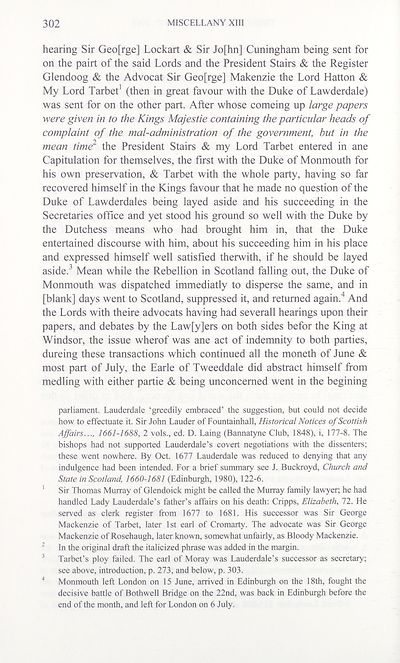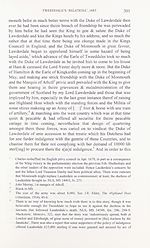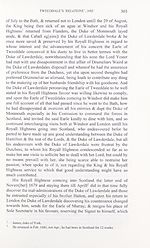Series 5 > Miscellany [of the Scottish History Society] XIII
(317) Page 302
Download files
Complete book:
Individual page:
Thumbnail gallery: Grid view | List view

302
MISCELLANY XIII
hearing Sir Geo[rge] Lockart & Sir Jo[hn] Cuningham being sent for
on the pairt of the said Lords and the President Stairs & the Register
Glendoog & the Advocat Sir Geo[rge] Makenzie the Lord Hatton &
My Lord Tarbet1 (then in great favour with the Duke of Lawderdale)
was sent for on the other part. After whose comeing up large papers
were given in to the Kings Majestie containing the particular heads of
complaint of the mal-administration of the government, but in the
mean time2 the President Stairs & my Lord Tarbet entered in ane
Capitulation for themselves, the first with the Duke of Monmouth for
his own preservation, & Tarbet with the whole party, having so far
recovered himself in the Kings favour that he made no question of the
Duke of Lawderdales being layed aside and his succeeding in the
Secretaries office and yet stood his ground so well with the Duke by
the Dutchess means who had brought him in, that the Duke
entertained discourse with him, about his succeeding him in his place
and expressed himself well satisfied therwith, if he should be layed
aside.3 Mean while the Rebellion in Scotland falling out, the Duke of
Monmouth was dispatched immediatly to disperse the same, and in
[blank] days went to Scotland, suppressed it, and returned again.4 And
the Lords with theire advocats having had severall hearings upon their
papers, and debates by the Law[y]ers on both sides befor the King at
Windsor, the issue wherof was ane act of indemnity to both parties,
dureing these transactions which continued all the moneth of June &
most part of July, the Earle of Tweeddale did abstract himself from
medling with either partie & being unconcerned went in the begining
parliament. Lauderdale ‘greedily embraced’ the suggestion, but could not decide
how to effectuate it. Sir John Lauder of Eountainhall, Historical Notices of Scottish
Affairs..., 1661-1688, 2 vols., ed. D. Laing (Bannatyne Club, 1848), i, 177-8. The
bishops had not supported Lauderdale’s covert negotiations with the dissenters;
these went nowhere. By Oct. 1677 Lauderdale was reduced to denying that any
indulgence had been intended. For a brief summary see J. Buckroyd, Church and
State in Scotland, 1660-1681 (Edinburgh, 1980), 122-6.
1 Sir Thomas Murray of Glendoick might be called the Murray family lawyer; he had
handled Lady Lauderdale’s father’s affairs on his death: Cripps, Elizabeth, 72. He
served as clerk register from 1677 to 1681. His successor was Sir George
Mackenzie of Tarbet, later 1st earl of Cromarty. The advocate was Sir George
Mackenzie of Rosehaugh, later known, somewhat unfairly, as Bloody Mackenzie.
2 In the original draft the italicized phrase was added in the margin.
3 Tarbet’s ploy failed. The earl of Moray was Lauderdale’s successor as secretary;
see above, introduction, p. 273, and below, p. 303.
4 Monmouth left London on 15 June, arrived in Edinburgh on the 18th, fought the
decisive battle of Bothwell Bridge on the 22nd, was back in Edinburgh before the
end of the month, and left for London on 6 July.
MISCELLANY XIII
hearing Sir Geo[rge] Lockart & Sir Jo[hn] Cuningham being sent for
on the pairt of the said Lords and the President Stairs & the Register
Glendoog & the Advocat Sir Geo[rge] Makenzie the Lord Hatton &
My Lord Tarbet1 (then in great favour with the Duke of Lawderdale)
was sent for on the other part. After whose comeing up large papers
were given in to the Kings Majestie containing the particular heads of
complaint of the mal-administration of the government, but in the
mean time2 the President Stairs & my Lord Tarbet entered in ane
Capitulation for themselves, the first with the Duke of Monmouth for
his own preservation, & Tarbet with the whole party, having so far
recovered himself in the Kings favour that he made no question of the
Duke of Lawderdales being layed aside and his succeeding in the
Secretaries office and yet stood his ground so well with the Duke by
the Dutchess means who had brought him in, that the Duke
entertained discourse with him, about his succeeding him in his place
and expressed himself well satisfied therwith, if he should be layed
aside.3 Mean while the Rebellion in Scotland falling out, the Duke of
Monmouth was dispatched immediatly to disperse the same, and in
[blank] days went to Scotland, suppressed it, and returned again.4 And
the Lords with theire advocats having had severall hearings upon their
papers, and debates by the Law[y]ers on both sides befor the King at
Windsor, the issue wherof was ane act of indemnity to both parties,
dureing these transactions which continued all the moneth of June &
most part of July, the Earle of Tweeddale did abstract himself from
medling with either partie & being unconcerned went in the begining
parliament. Lauderdale ‘greedily embraced’ the suggestion, but could not decide
how to effectuate it. Sir John Lauder of Eountainhall, Historical Notices of Scottish
Affairs..., 1661-1688, 2 vols., ed. D. Laing (Bannatyne Club, 1848), i, 177-8. The
bishops had not supported Lauderdale’s covert negotiations with the dissenters;
these went nowhere. By Oct. 1677 Lauderdale was reduced to denying that any
indulgence had been intended. For a brief summary see J. Buckroyd, Church and
State in Scotland, 1660-1681 (Edinburgh, 1980), 122-6.
1 Sir Thomas Murray of Glendoick might be called the Murray family lawyer; he had
handled Lady Lauderdale’s father’s affairs on his death: Cripps, Elizabeth, 72. He
served as clerk register from 1677 to 1681. His successor was Sir George
Mackenzie of Tarbet, later 1st earl of Cromarty. The advocate was Sir George
Mackenzie of Rosehaugh, later known, somewhat unfairly, as Bloody Mackenzie.
2 In the original draft the italicized phrase was added in the margin.
3 Tarbet’s ploy failed. The earl of Moray was Lauderdale’s successor as secretary;
see above, introduction, p. 273, and below, p. 303.
4 Monmouth left London on 15 June, arrived in Edinburgh on the 18th, fought the
decisive battle of Bothwell Bridge on the 22nd, was back in Edinburgh before the
end of the month, and left for London on 6 July.
Set display mode to:
![]() Universal Viewer |
Universal Viewer | ![]() Mirador |
Large image | Transcription
Mirador |
Large image | Transcription
Images and transcriptions on this page, including medium image downloads, may be used under the Creative Commons Attribution 4.0 International Licence unless otherwise stated. ![]()
| Scottish History Society volumes > Series 5 > Miscellany [of the Scottish History Society] XIII > (317) Page 302 |
|---|
| Permanent URL | https://digital.nls.uk/127317333 |
|---|
| Description | Over 180 volumes, published by the Scottish History Society, containing original sources on Scotland's history and people. With a wide range of subjects, the books collectively cover all periods from the 12th to 20th centuries, and reflect changing trends in Scottish history. Sources are accompanied by scholarly interpretation, references and bibliographies. Volumes are usually published annually, and more digitised volumes will be added as they become available. |
|---|


